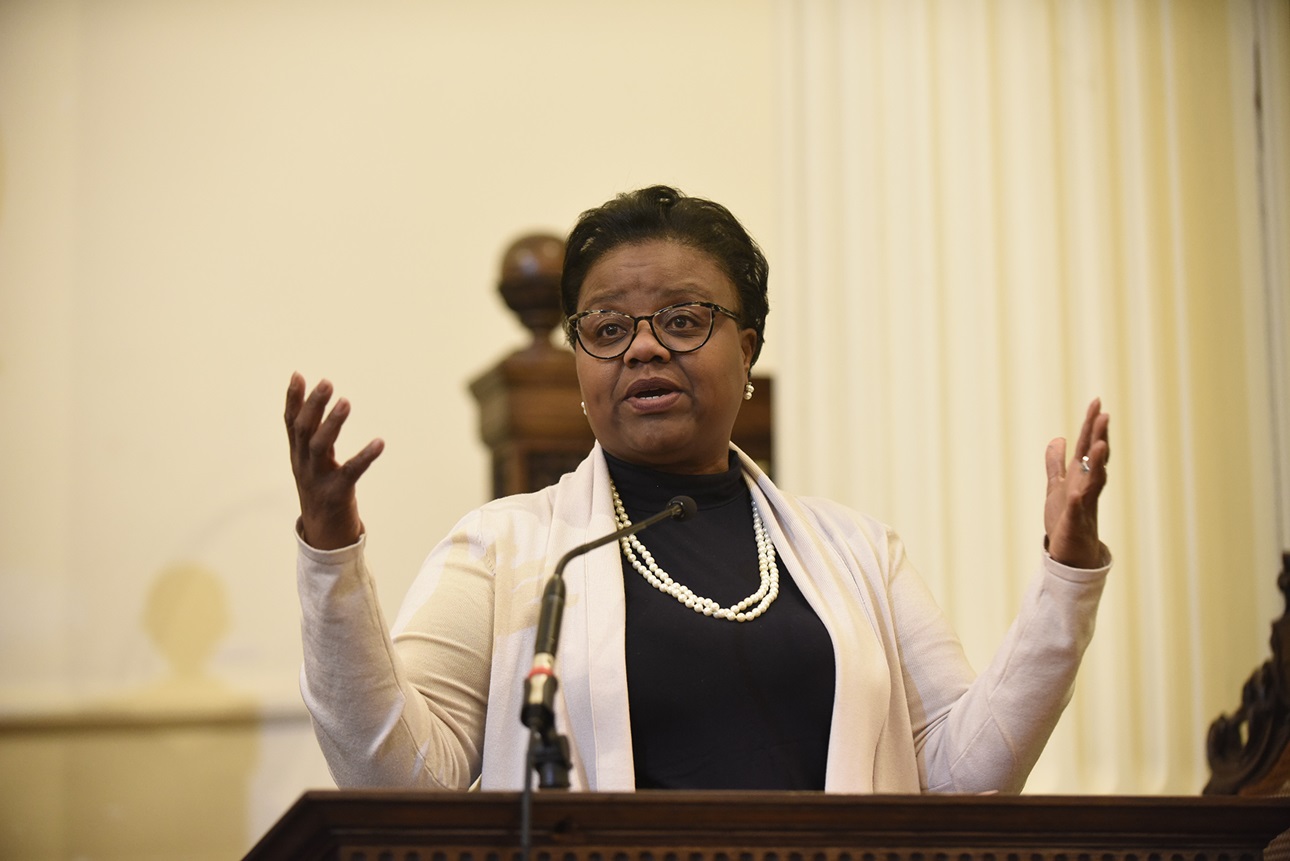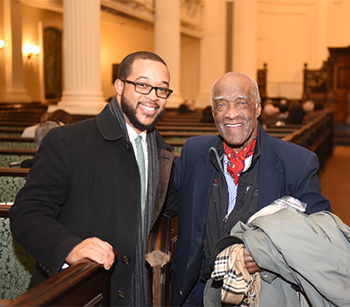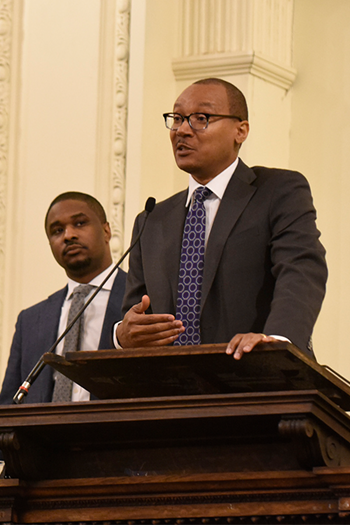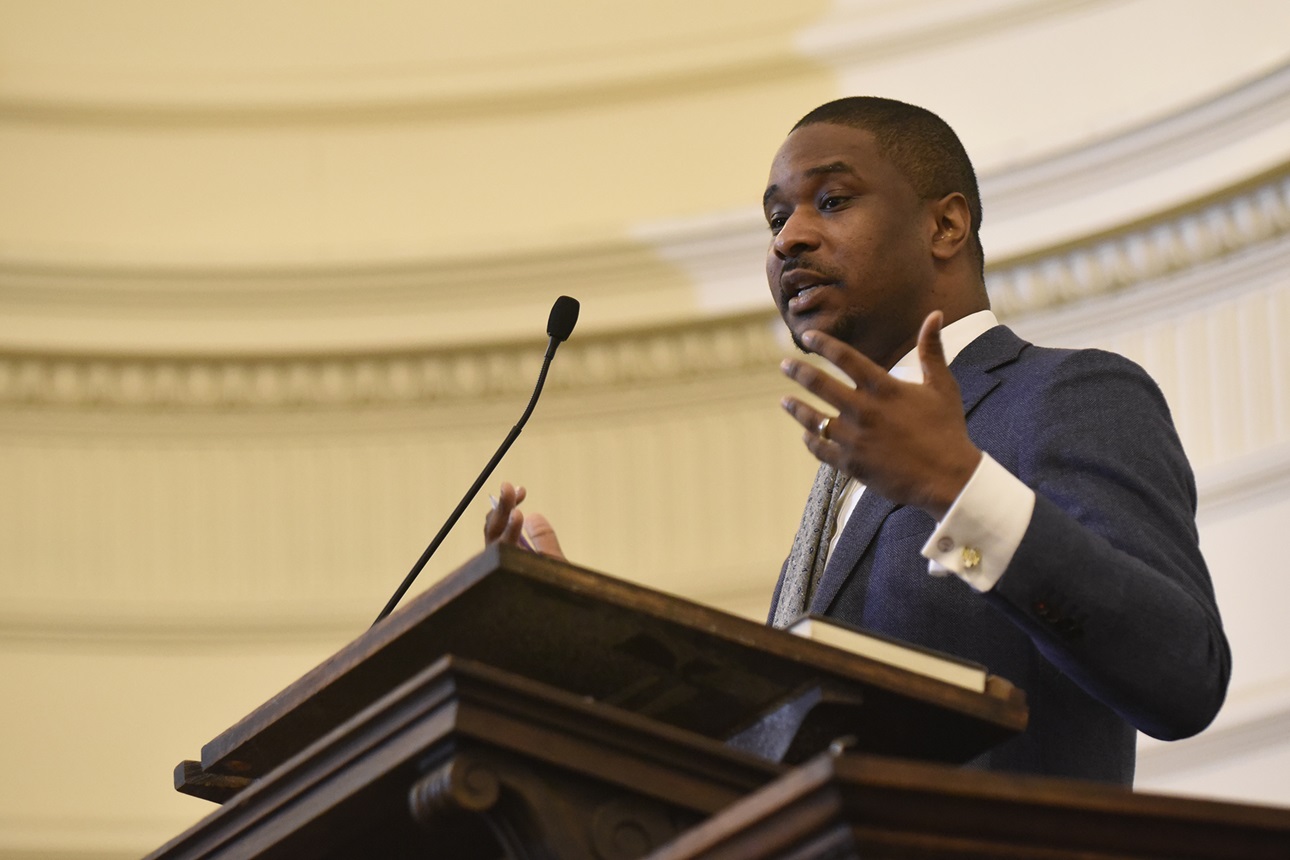A Testing Ground for the Ideal of Freedom
How Martin Luther King, Jr.’s Ideas Resonate in Today’s Boston
TBF News Winter 2019
The historic Arlington Street Church, where Martin Luther King, Jr. forged a lifelong friendship with the Unitarian minister Dana McLean Greeley in the 1950s, was the setting of the first of a series of four teach-ins being organized by King Boston. It was held on January 15th to honor King’s 90th birthday.
King Boston is co-chaired by Paul English and Rev. Liz Walker, led by Marie St. Fleur and housed at the Boston Foundation. Its mission is to build a world-class memorial on Boston Common to the legacy of Dr. King and Coretta Scott King, who spent formative years here, as well as a dynamic Center for Civic Engagement and Economic Justice in Roxbury.
After warm welcoming remarks from Rev. Kim K. Crawford Harvie, who spoke of the relationship King had with the church, St. Fleur asked, “What better space for this teach-in than the place where King found friendship and peace?” She went on to say that King Boston will have a “living role” in the community with the development of the King Center for Economic Justice in Roxbury, an inclusive public space to promote informed community dialogue, civic engagement and activism.
Boston Foundation President and CEO Paul S. Grogan spoke next, saying, “It is time to reclaim the Kings as Bostonians.” He reminded those gathered that King led a march from Roxbury to the Boston Common in 1965, where he gave a speech referring to Boston as “one of the cities which I call home.” He went on to challenge the crowd of 22,000 people to fight the “crippling poverty and injustice” he saw in Boston’s neighborhoods. King ended by saying, “Boston must become a testing ground for the ideal of freedom.”
The teach-in drew a diverse group of close to 100 people—ranging in age and experience from retired Lt. Col. Enoch Woodhouse, a former Tuskegee Airman, to Boston Foundation donors and young college students. In the tradition of teach-ins held in the 1960s, it was led by two professors: Tommie Shelby and Brandon M. Terry of Harvard University’s African and African American Studies Department. Both have written and lectured extensively on King and co-edited the new book To Shape a New World on the political philosophy of King. They presented what St. Fleur later called “an un-romanticized view” of King.
Shelby reviewed four principles at the heart of King’s philosophy: No one should be forced to live in poverty while others live in luxury; all individuals should be equipped with adequate resources to take advantage of their formal freedoms; everyone should have access to work, with those not employed by the private sector offered jobs in the public sector; and the fruits of labor and productivity should benefit all, not just business owners.
He pointed out that the problems King faced still exist in today’s Boston, where the Black unemployment rate is twice that of whites and the real wages of average workers have not improved since the 1960s. In fact, the gulf between rich and poor is even wider than when King was beginning to wonder: “Do we have the political capacity to tame our worst excesses?”
Terry spoke next, saying that at the time King was assassinated, he was “isolated and profoundly unpopular”—on the right, for his opposition to the Vietnam War, and on the left, for his nonviolent approach to resistance. Still, he went on to form the Poor People’s Campaign in 1967 and rail against a country in which “people are poor by the millions” and “perishing on a lonely island of poverty in the midst of a vast ocean of material prosperity.”
Terry outlined some of King’s solutions to poverty, such as a guaranteed minimum income that would bring dignity to all Americans, reminding the audience that in today’s America, 19 million people live in deep poverty while the top one percent own 40 percent of the nation’s wealth—more than the bottom 90 percent combined.
“What King wanted in the end was non-violent direct action that would take on the country’s inequities,” concluded Terry, “an egalitarian movement that he believed must include the disenfranchised. He had faith in the political and moral agency of the oppressed.”
Following the presentations, St. Fleur urged audience members to “get to work,” starting by asking questions of the professors.
Longtime Boston activist Kathie Mainzer asked about King’s approach to civil disobedience and any lessons that might be applied to today’s activism. Terry responded that King was constantly thinking about what would grab attention, even at a granular level. He said that some effective strategies, which King employed, include acts of scale, such as the 1963 March on Washington and the massive 2017 Women’s March. He also said that feats of endurance grab the public’s attention, such as boycotts in the 1960s and more recently Occupy Wall Street, the 2011 movement that lasted almost two months, as well as the 2014 uprising in Ferguson, Missouri, after the shooting of Michael Brown, which involved protests every day over the course of an entire year.
One of the most eloquent remarks about the troubling times Americans are coping with today came from Suffolk County Sheriff Steven Tompkins. “First, I want to remind us that it is always darkest before the dawn,” he said, “and that we are our brother’s keeper.” He blamed the lack of civic engagement in the country in recent years on “the day that public education eliminated civics from its curriculum,” adding that one of the positive things about the current political turmoil is that now people are awakened and civically engaged again. That is crucial to our future, he added, because “it requires us to bring the dawn.”




